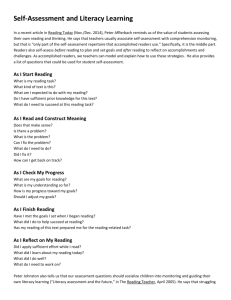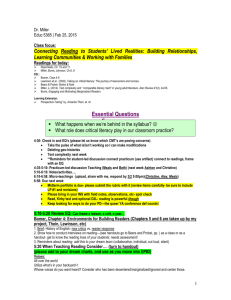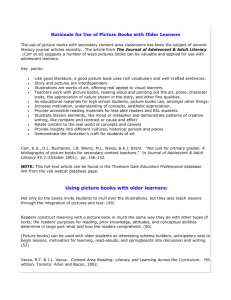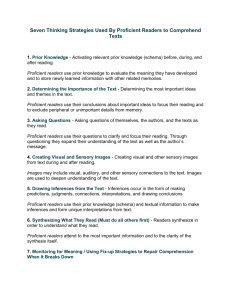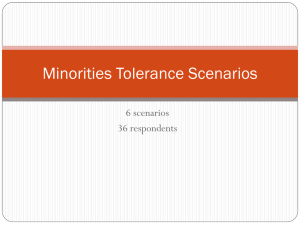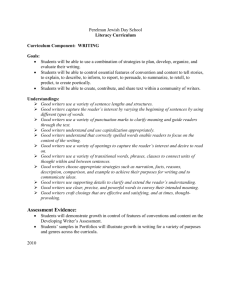Motivation and Engagement Problem Solving Activity
advertisement
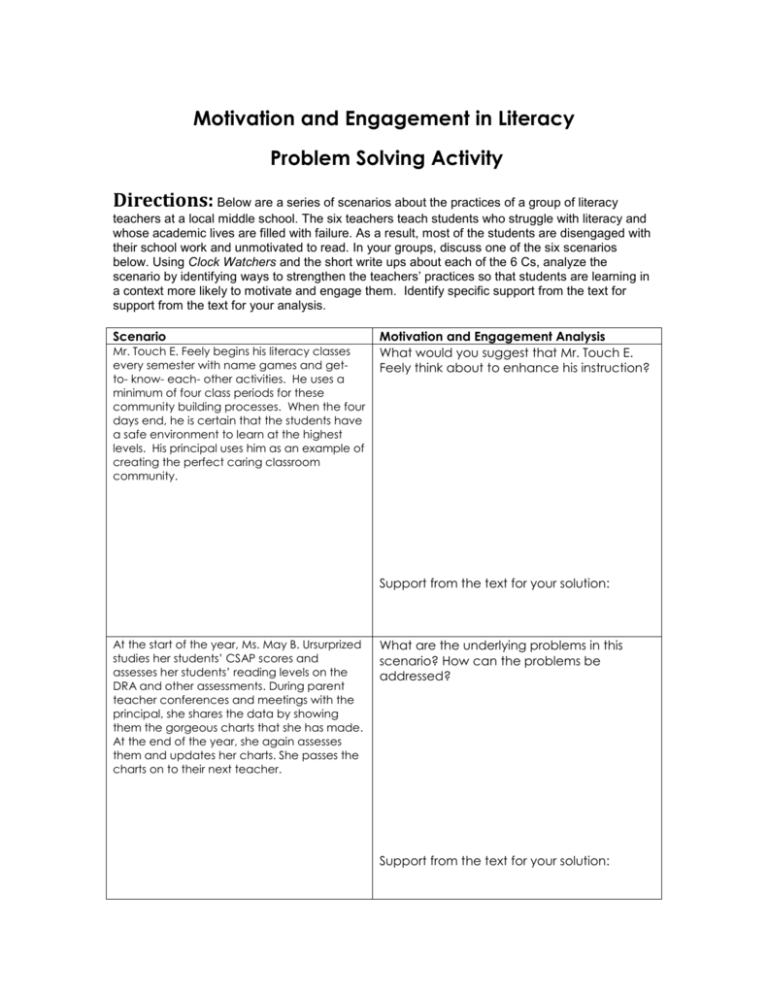
Motivation and Engagement in Literacy Problem Solving Activity Directions: Below are a series of scenarios about the practices of a group of literacy teachers at a local middle school. The six teachers teach students who struggle with literacy and whose academic lives are filled with failure. As a result, most of the students are disengaged with their school work and unmotivated to read. In your groups, discuss one of the six scenarios below. Using Clock Watchers and the short write ups about each of the 6 Cs, analyze the scenario by identifying ways to strengthen the teachers’ practices so that students are learning in a context more likely to motivate and engage them. Identify specific support from the text for support from the text for your analysis. Scenario Mr. Touch E. Feely begins his literacy classes every semester with name games and getto- know- each- other activities. He uses a minimum of four class periods for these community building processes. When the four days end, he is certain that the students have a safe environment to learn at the highest levels. His principal uses him as an example of creating the perfect caring classroom community. Motivation and Engagement Analysis What would you suggest that Mr. Touch E. Feely think about to enhance his instruction? Support from the text for your solution: At the start of the year, Ms. May B. Ursurprized studies her students’ CSAP scores and assesses her students’ reading levels on the DRA and other assessments. During parent teacher conferences and meetings with the principal, she shares the data by showing them the gorgeous charts that she has made. At the end of the year, she again assesses them and updates her charts. She passes the charts on to their next teacher. What are the underlying problems in this scenario? How can the problems be addressed? Support from the text for your solution: Ms. Ima Joiner believes group work engages learners and emphasizes the need to collaborate for successful learning. At the start of the year, she looks at the data and determines four groups: the advanced readers, proficient readers, partially proficient, and unsatisfactory readers. Of course, she doesn’t let students know how she grouped them. When she works with students during guided reading or asks them to discuss their reading, she knows that they are reading at their level with peers sharing similar strengths and needs. What are the underlying problems in this scenario? And how can the problems be addressed? Support from the text for your solution: List five ways that Ms. Joiner could use groups so that students become more proficient readers. Mr. Will U. Risk works with students who hate to read and whose skills are pretty darned shaky. He strongly believes in the importance of choice of novels. On his bulletin board are the covers of popular books and titles of winners of Newbery novels. He’s certain that the information on the bulletin board will motivate all of his students to find a fun book to read. Several times a month he takes his students to the library and invites them to select a novel for independent reading. When he notices that students are having a difficult time finding a book, he encourages them to see what a buddy is reading and suggests that they read the same book. What are the underlying problems in this scenario? How can the problems be addressed? Support from the text for your solution: Ms. Ima Softie loves her struggling readers. She knows that their academic careers have been filled with disappointments and struggles. Each year her goal for her class is to make sure they feel darned good about themselves as readers. Enough of the tension that they’ve faced in the past! This year is about success. As a result, she finds book for them to read that they’ll love and that they will be successful reading. Her room is filled with easy books that won’t stress her kids out, and when she sees kids struggling and about to give up, she helps them out by easing up on the work or giving them hints about the right answers. What are the underlying problems in this scenario? How can the problems be addressed? Support from the text for your solution: Ms. R. U. Happi loves celebrating her students’ work. At the end of each unit, she plans a special day for students to show off their good work and to cheer their efforts throughout the unit. For instance, at the end of the poetry unit, each student reads a favorite poem in a What are the underlying problems in this scenario? How can the problems be addressed? poetry slam, and at the end of the year, she holds a high tea for students to just kick back and enjoy themselves. “We save our celebrations for those special days,” she explained to one parent. “That way they know that their hard work is worth the effort.” Support from the text for your solution:


